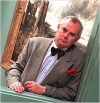Patrick McCaughey

Patrick McCaughey is former Director of the National Gallery of Victoria, the Wadsworth Atheneum in Hartford Connecticut, and the Yale Center for British Art. His most recent book is Strange Country: Why Australian Painting Matters (2014). His other works include Voyage and Landfall: The Art of Jan Senbergs (2006). He writes regularly for the Times Literary Supplement and Australian Book Review. He lives and works on the banks of the Quinnipiac River in New Haven, and has recently finished editing Fred Williams: Diaries 1963–1970 for the Miegunyah Press.
A major revolution swept through British art history in the 1980s. It shook up its genteel ways and turned it resolutely, even militantly, towards the social history of art. John Barrell's The Dark Side of the Landscape, Michael Rosenthal's Constable, Ann Bermingham's Landscape and Ideology, and Marcia Pointon's Hanging the Head were the key texts. The most incendiary of the new British art histor ... (read more)
Philippe de Montebello was Director of the Metropolitan Museum of Art for thirty-one years. The astonishing length of his tenure is matched by the brilliance of his reign. Every part of the museum's forty-plus acres of exhibition space was renewed or transformed during those years, from classical antiquity to twentieth- and twenty-first-century art. Not a tatty corner or a tired old gallery remain ... (read more)
By some accounts, it was love at first sight. When Kenneth Clark, recently graduated with a 2A from Oxford, lunched with Bernard Berenson at I Tatti in September 1925, BB impulsively invited him to collaborate on the revised edition of his chef d’oeuvre: The Drawings of the Florentine Painters, Classified, Criticized and Studied as Documents in the History and Appreciation of Tuscan Art with a C ... (read more)
Every student of Australian art knows that when Arthur Boyd went to London in 1959 and paid his first visit to the National Gallery, two paintings laid siege to his imagination. Titian’s The Death of Actaeon was one from which came Boyd’s tormented Nude and Beast series. The other was Piero di Cosimo’s panel now spiritlessly titled A Satyr Mourning over a Nymph, then known as The Death of P ... (read more)
Eight years ago Darleen Bungey published a revelatory biography of Arthur Boyd. She cast shadows across the ‘idyllic’ Open Country years where the extended Boyd family lived in suburban Murrumbeena and unflinchingly detailed his declining, alcoholic years at Bundanon. Bungey’s compelling new biography of John Olsen has its share of revelations. Olsen’s weak and inadequate father wound up d ... (read more)
The Rijksmuseum used to be the dullest of the major European collections. It looked as though Ursula Hoff had painted all the pictures. An air of dowdiness hung over the massive building and crowded collections where the good and the great indiscriminately mixed in with the mediocre in warren-like galleries with an over-supply of the decorative arts.
... (read more)
The Rijksmuseum used to be the dullest of the major European collections. It looked as though Ursula Hoff had painted all the pictures. An air of dowdiness hung over the massive building and crowded collections where the good and the great indiscriminately mixed in with the mediocre in warren-like galleries with an over-supply of the decorative arts.
After years of ‘recuperation’, as the Span ... (read more)
Picasso at twenty-five was famous in Paris, comfortably off by 1914, wealthy and internationally recognised six years later. He married a leading ballerina, Olga Khokhlova, in Serge Diaghilev’s Ballets Russes. It turned out badly. Two of his mistresses, Fernande Olivier and FranÇoise Gilot, wrote tell-all memoirs, which he did his best, unsuccessfully, to repress. At least two other mistresses, ... (read more)
Roy Strong was appointed director of the National Portrait Gallery (NPG) in 1967 at the age of thirty-two. Today it would be astonishing to head one of the United Kingdom’s national collections at that age; five decades ago it was outrageous. Only Kenneth Clark at thirty was younger when he became director of the National Gallery. Strong’s ascent to the NPG has stayed in his mind as the fulcru ... (read more)
